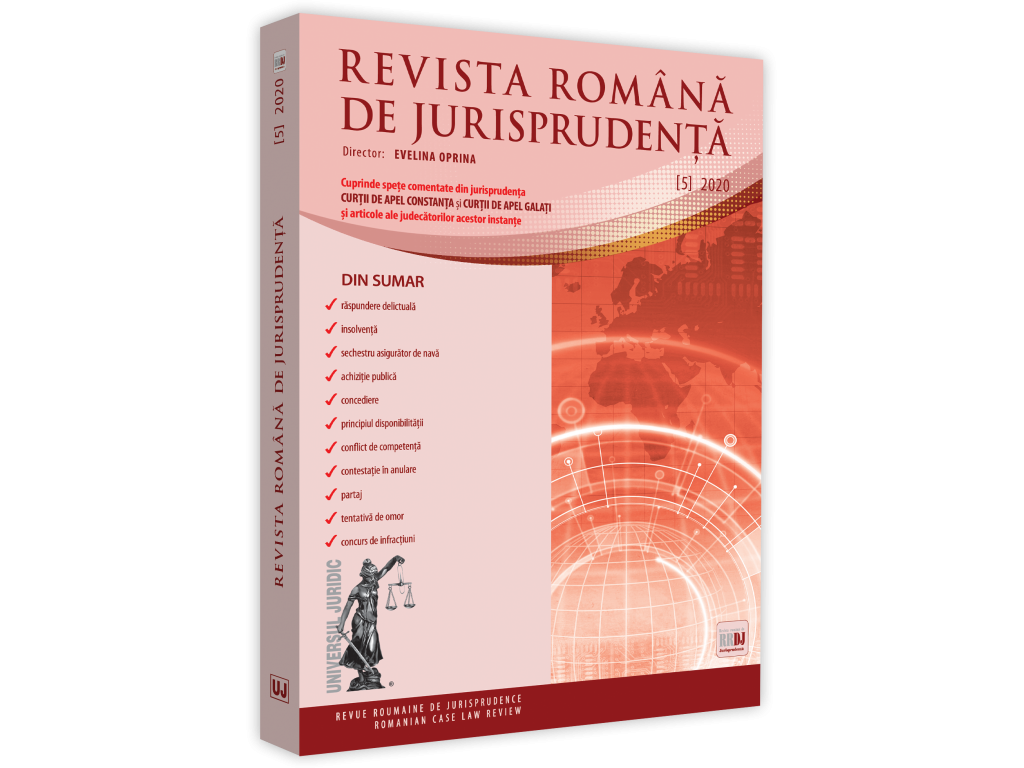Patrimonial liability of the public receiver. The damage created with the international trips of the city hall employees – means of recovery
DREPTUL MUNCII ŞI DREPTUL SECURITĂŢII SOCIALE
Abstract
The deed imputed through the statement of claim concerns the non-observance of the legal conditions for trips abroad, a deed committed by the defendant as authorizing officer. It was held in this respect that „The authorizing officers have the obligation to commit and
use the budgetary loans only within the approved provisions and destinations, for expenses strictly related to the activity of said public institutions and in compliance with the legal provisions” (Article 23 of Law 273/2006)
The court ruled that it is essential in this case to establish the cause of the damage alleged by the claimant, and this consists in approving the trip of employees by the head of the administrative-territorial unit – the mayor.
The individual legal commitment, ordered by the elected mayor and being covered by the provisional legal commitment, was followed by the procedure for liquidation of expenses, when the supporting documents were verified (in our case tax invoices), the „good payment order” note was added and subsequently the expenses were ordered.
In such conditions, the liability of the authorizing officer for compliance with the principle of economy and efficiency of expenditure is subsidiary to the liability of the head of the unit, who unilaterally ordered the these expenses, in exercising the rights conferred by
Article 63 of Law 215/2001.
As a consequence, whenever there is the approval of the mayor in the case regarding the travel, the act generating damages is incumbent upon the mayor, consequently the other conditions of the patrimonial responsibility incumbent on public administrator will no longer be verified.
On the other hand, it is found that whenever there is no approval of the mayor, the authorizing officer had the obligation to verify the prior existence of the legal commitment, and if it did not exist, the expense liquidation and ordering could not be ordered in a correlative manner, in the latter case the damage being imputable to the public administrator.
With the local budget execution account approved by the local council, the purpose provided by law was achieved, but it cannot be held that the effect of this approval could
give discharge to the authorizing officer regarding compliance with the principles of legality, regularity, economy, efficiency and effectiveness. Consequently, the defense regarding the existence of these decisions of the local council is not relevant in the case in terms of exemption from liability of the authorizing officer, which is expressly established by law, and in the absence of contrary provisions, no other value can be given, by way of interpretation, to these administrative acts issued by the local deliberative body.
We are not in the hypothesis of an undue payment, considering the provisions of Article 256 corroborated with the common law in the matter. In this respect, Article 1,341 paragraph (1) of the Civil Code orders as follows: „The person who pays without owing has the right to restitution”. In other words, the undue payment gives rise to a relation of obligation, in which solvens, who made that payment, has a right of claim, i.e, the right to ask accipiens to return the performance, without being due. It is also necessary to note the fact that the payment, seen as a material fact, must be made by solvens, in principle, solvendi gratia, in other words, with the intention of extinguishing a debt, which in reality does not exist.
In the present case, the employer did not pay to the civil servants who made the trips a sum of money with the intention of settling a debt, and the beneficiary of the fiscal invoices is the town hall, and the payment was made directly by the unit to the service provider.
Therefore, in this payment, the employees were not even a party, but third parties to the contractual relationship in which the payment was made. As they are therefore not
concerned in the event that an employee received an undue amount from the employer, those provisions do not apply in the present case.
Regarding the nature of the due interests, this can only be the penalizing legal interest, according to Article 1535 of the Civil Code in conjunction with GO no. 13/2011 (Article 1 paragraph 3), and the damage found is civil, arising from a labor law relationship, therefore the capacity of the employer (administrative-territorial unit) is not amenable to change the nature of the claim so that the special provisions regarding tax receivables become applicable (GO no. 92/2001, respectively Law no. 207/2015).








